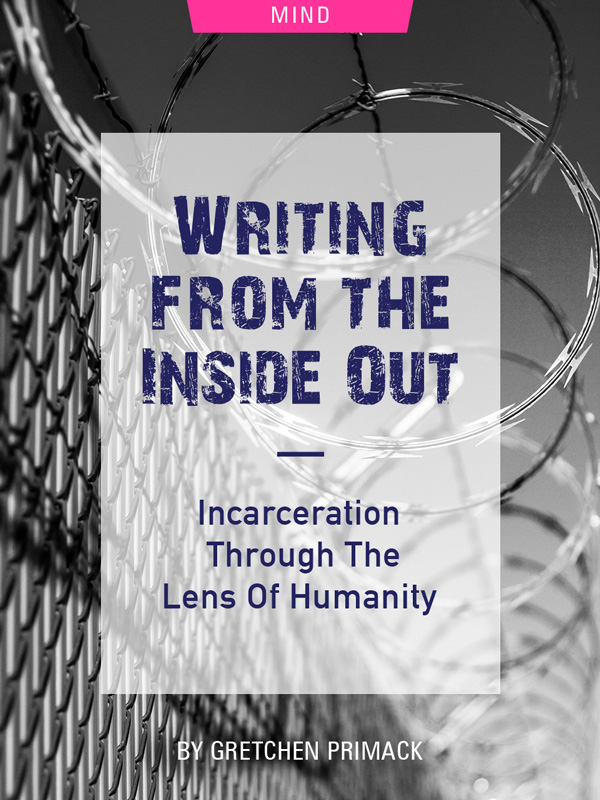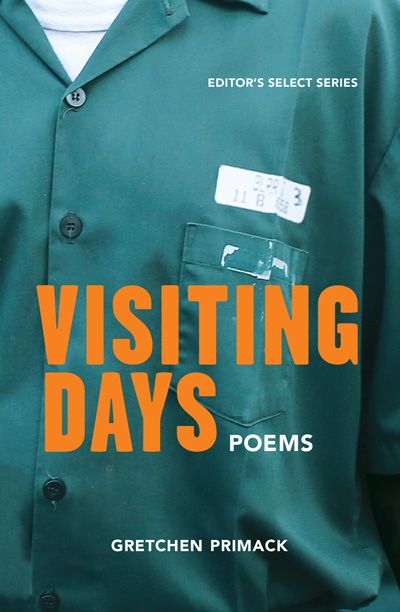
Inspired by those locked away and too often forgotten, one woman shines light on incarcerated men through education, poetry and hope
—
I remember the first time I shut the classroom door behind me in a maximum-security men’s prison. I don’t remember it because it was frightening — it wasn’t. I remember it because I felt at home. I was in the right place.
Between the chalkboard and the barred windows, I found 15 college students waiting for me. They opened their notebooks and we began our discussion. About five minutes later, there was a voice on the intercom. Somehow, two and a half hours had passed, and it was time for me to leave. I didn’t want to.
Those students wrote me papers about Erich Fromm’s ideas on disobedience, Elizabeth Cady Stanton’s deft use of Thomas Jefferson’s work, and MLK, Jr.’s rhetorical choices. One of my students started his college career writing about Plato’s cave in my class. He finished his coursework with a 100-page senior project about feminism and Shakespeare a few years later.
That first class met almost 15 years ago. I’m still teaching in prison. Most people who do that will tell you what I’m about to:
Once you have engaged with these students, you don’t want to teach in a traditional college classroom. In prison, college propels powerful life changes that are hard to quantify.
When you have worked with students as mature and driven as these, students with this much torque on their education goals and this much commitment to the process, you don’t want to go back to students who enrolled in college because that’s “just what you do” (I count myself in that category).
We outside the barbed wire can forget that those within it are individuals with names, pasts, quirks, talents, families, emotions, bodies, transformations, futures — just like every other sentient being on this planet.
The notion that everyone behind bars is a monster; that they are all the same; that justice is being served by each unique person’s placement there; that they would never be productive/positive members of society; that they don’t wish to grow and change; that they don’t follow what’s going on in the world outside — these are dangerous myths.
We like to believe that anyone we subjugate, human or non-human, is part of a nameless, faceless group that deserves what it gets. That lets us not care about injustice. It lets us be lazy. It makes it easier for us to continue ineffective, inefficient, oppressive systems.
I’m a poet, so to put it poetically: What a bunch of crap.
For many years, people would ask me if I was writing poems about prison. I wasn’t. I wasn’t there for writing fodder. But during a hiatus between one teaching gig and another, inspired by my many incarcerated and formerly-incarcerated friends and in homage to them, words began to flow. Of course, I draw on the experiences and philosophies of people I have known, but I could never speak for them: they are men who can speak for themselves. So, I created a fictional world, an imaginary prison populated by the voices of imaginary men. From that world, Visiting Days was born in April 2019.
Visiting Days was published by Willow Books, a wonderful small press started by the Detroit-based Renaissance woman Heather Buchanan. Its poetry editor, Randall Horton, solicited the manuscript because he felt it was timely in the way it cast incarceration in poetry. Randall is a brilliant poet, and he’s also formerly incarcerated and understands as much as anyone does the damage that de-individualizing men and women does to them, their families, and society. Truthfully, I didn’t think I’d be a candidate for Willow because it has historically only published writers of color. I’m proud to be part of their roster.
I’ve had a wonderful time launching Visiting Days outside prison walls, but the most satisfying feedback has come from inside. I’ve sent the book to several men I know who are still incarcerated, and they in turn have shared it with others. The comments have been profoundly moving. One man I don’t know who borrowed the book wrote:
“It is enriching to know that there are still people who take the time to listen to us. We are often forgotten in here, with no outlet through which to express ourselves. I think that poetry is a great vehicle of expression, but there is often a traffic jam preventing any real communication. Seeing this book being published caused me to feel whole again, as if my voice could one day be worthy of being heard.”
Another commented:
“I ran through many emotions as I read Visiting Days because it seemed that I was reading my own thoughts and emotions put down on paper for me. There are just so many frustrations that I go through from not being able to express how I feel being in here for so long. Then here comes this book expressing those things.”
No responses have been more satisfying than these and ones like them, responses that connect these poems from an outsider directly to the voices inside. We feel each other’s individuality, which is of course how it should be. In the words of another Sing Sing reader:
“It’s about time that people stop forgetting about us and throwing away the keys. We are not all monsters. Some of us are good people who just need a second chance. We hurt and we feel happy. We fail and excel. We are vessels of potential, and that’s forgotten. Hopefully now it’s not.”
I wish this didn’t need to be said, but it does: no one is more individual than anyone else, wherever they reside, whatever their pasts or contexts or stories or families.
What a world we’d have if we created societies with that in mind.
—
Poems from Visiting Days
Prison labor is deservedly controversial. Several poems in the collection deal with this subject, including one that sees the desk welded by an incarcerated man in a prison workshop placed in the Freedom Tower — this is our ironic 21st century reality. Here’s one in the voice of someone working in a prison mattress shop:
Ernest (Vocational)
“The materials produced by the Mattress Shop are standard items used in state and local facilities and universities throughout the state.” — NYS Department of Corrections
Education is part of this. For instance: I had to get my GED.
And for instance: my work will lie under a student
at Buffalo State. On my clothed buttons lie students
about to get laid, students dreaming of books
and getting laid. Dreaming of stories and science. Never
of their mattress. Never of its tufting machine operator,
or tape edge operator, never of its felon. Its spring mattress
assembler. Its twenty-to-life adhesive operator, cutting
machine operator, conditional-release-2023 mattress
sewing machine operator, its GED-2012 stuffing machine
operator, its man.
The poem “Knowledge” is inspired by someone I met who, like me, is an activist on behalf of non-human animals. This man, Intelligent, developed an anti-violence philosophy while incarcerated as part of his rehabilitation, and in doing so “extended his circle of compassion to include all living things,” as Albert Schweitzer urges. To Intelligent, violence is violence, whether it is to a man or a hen. He maintained a vegan lifestyle within prison walls, an enormous challenge. He’s since been released and continues his vegan activism. I wanted to honor him and his philosophy, and share his message of compassion:
Knowledge (East Wing)
I honor life by not taking it anymore. Not a fish’s life.
Not a calf’s. No one’s brother or child.
I did violence. I put it between my teeth
and it formed my blood, and I took blood.
Now I eat what they ate in Eden before violence.
Now I ask forgiveness for the life I’ve taken
that wasn’t mine to take—the man, and the calves
and fishes, the chicks and their mothers.
The cops laugh. Their work is domination.
They lord over, and some men on the block
call themselves kings. But I am done with that,
in every soul of me, every body.
As regimented and oppressive as prison is, people can find ways to own their own lives and grow into themselves. One way is through reading and writing literature. One of the many people who have found themselves through poetry while incarcerated is Etheridge Knight. His poems in turn have influenced and solaced many. “Knight (East Wing)” includes several phrases from brilliant poems that Etheridge Knight wrote in prison. I wanted to honor Etheridge Knight’s enormous influence:
Knight (East Wing)
Poisoned water, poisoned sleep
ground under the heel of my pillow.
If I didn’t know your cell song,
I would think I tread the red
circle alone.
But Etheridge, I found you
here, and I have rolled
myself up in your night speech,
so I know something good
come out of prison.
And I have pressed against
the western wall, so I know
you saw through stone.
It’s not visions in my cell,
never those. Tony hung
from his sheet and I see him.
I see the bars cut the tensed cloth
into pieces across from me.
But not as visions.
And I’d like to report to you,
Sir Knight who gifted me
a name:
Sometimes the wind rings
in this ear and then the other,
but this poetman will die
as trumpets.
Something good come out
of prison.
Have you ever wanted to be alone with someone you love? Imagine that being impossible. For most people in prison, it’s just that. Of course, that’s the reality for the people they love who aren’t incarcerated, too: they’re being punished as well. “Ingrid” imagines a woman coming to visit her beloved in prison. She, like all visitors, arrives first and waits for him in a room full of couples and families, bearing witness to the reduction of relationships to these public, regimented, curtailed sessions:
Ingrid (Visiting room)
The woman who won’t shut up, the kid whose eyes cross,
the couple old as Moses with their slip-on shoes and clear bag
of dollars. We all go straight for the vending machines, Swiss
steaks enrobed in plastic for her, Swiss & turkey sub for him,
must be something about the Alps.
What if the guard told a joke that was funny? There was a jumble
of high chairs in that corner when I got here, now just one
facing the wall, the wall an under-the-sea mural, all of us fish
in air. The choking poster rolls its eyes above the Bible table.
Now the men come through, one of them you, and check in
at the guard’s double chin, like everyone, like always,
and like always for a moment I can’t look up.
The question of who is and who is not allowed to participate in society, to engage in citizenship, is on my mind a lot because it’s so clear that many of my students would be strong community members if given the opportunity. Here is a tribute to them:
Hawk (North Hall)
“You cannot promote free will… by extinguishing it.” — Bruce Western
A whistling hollow passes
as you pass another citizen
in the street. The whistling
hollow a dead soul makes, or
a me-shaped hole not
on its way to create
in the world. Not allowed
to create in the world.
And what will rush
into that vacuum?
What if I am
worthy, not danger.
I am denied you. And
you don’t know \
who you are
without me.
What if my will
would bend
toward citizen.
What if I would do
out there like you do.
Better.
—
You may also enjoy reading Life After Death Row: How Magick Saved My Life, by Damien Echols
